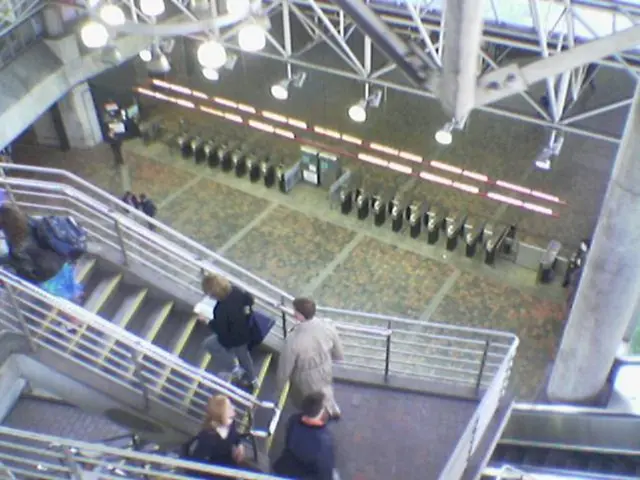Government strategy for monitoring 450,000 immigrant children: Persistent door-to-door visits and DNA tests by the Trump administration
Under the administration of President Donald Trump, a widespread, cross-agency investigation is underway, focusing on the safety and whereabouts of over 450,000 migrant children who crossed the U.S.-Mexico border without their parents during President Biden's term.
The Trump team has voiced concerns about the children's welfare and is taking drastic measures to ensure their safety, including home visits and interviews by Homeland Security and FBI agents. Critics, however, express apprehensions that this review could serve as a pretext for mass deportations, given Trump's well-known "zero-tolerance" approach to undocumented immigrants, which has resulted in children being flown out of the country in the past.
Trump officials have contended that adult sponsors who took in migrant children were not always thoroughly vetted, leaving some vulnerable to exploitation. A recent case involved a man indicted for enticing a 14-year-old girl from Guatemala to the U.S., falsely claiming her as his sister to obtain custody.
As the administration conducts door-to-door checks and interviews, more problematic sponsors are expected to surface, given the large number of complaints (approximately 65,000 since 2023) that have been filed. This year alone, about 450 cases with complaints have been referred to federal law enforcement officials.
The federal government has permitted adults to apply to house migrant children for over a decade, yet the program faced numerous issues, particularly during the Democratic administration, as officials struggled to handle the influx of thousands of children. In some instances, sponsors provided false identifications, while in others, background checks were neglected before placing children with sponsors.
Though thousands of children were placed with legitimate families, some now fear they may be swept up in the Trump administration's review and targeted for deportation. Advocates argue that deporting parents could have detrimental effects on children's wellbeing, potentially leading to three years of separation in one documented case.
So far, roughly 100 children have been removed from their sponsors and returned to federal custody since the review began. Investigators are focusing on suspicious sponsorship applications, including "super sponsors" who claimed to have family ties with multiple unaccompanied children. Videos and reports have emerged across the nation of armed law enforcement officers visiting the homes of unaccompanied minors and their sponsors.
In addition to the welfare checks, the Trump administration is working tirelessly to locate every child who has been placed with a sponsor. Critics, however, question the effectiveness and potential consequences of this approach, expressing concerns that children may not feel comfortable discussing abuse or concerns about their sponsors to armed agents from federal agencies, particularly during mass deportation campaigns.
The enhanced vetting measures introduced by the Trump administration, including fingerprinting, DNA testing, and income verification, could pose challenges for many sponsors, as they may not have stable incomes or legal status, further complicating the release of children from federal custody.
- In an attempt to address concerns, the Trump team is conducting home visits and interviews by Homeland Security and FBI agents as part of a cross-agency investigation into the whereabouts and safety of over 450,000 migrant children.
- Critics worry that this review could lead to a wave of mass deportations, given Trump's prior approach towards undocumented immigrants and the past instances of children being flown out of the country.
- Recently, adult sponsors who took in migrant children have been questioned due to inadequate vetting, leaving some vulnerable to exploitation, as demonstrated in a case involving a man indicted for enticing a minor girl from Guatemala.
- As door-to-door checks and interviews continue, more problematic sponsors may surface, given the high volume of complaints (approximately 65,000 since 2023) that have been filed.
- The federal government has allowed adults to apply to house migrant children for over a decade, but the program faced numerous issues, particularly during the Democratic administration, due to the influx of thousands of children and instances of false identifications or neglected background checks.
- Many fear that children placed with legitimate families may be targeted for deportation, which could have harmful effects on their wellbeing given that some cases have documented children facing three years of separation.
- To locate every child placed with a sponsor, the Trump administration is introducing enhanced vetting measures such as fingerprinting, DNA testing, and income verification, which could potentially challenge many sponsors, particularly those with unstable incomes or legal status.








